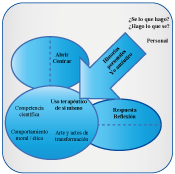The pattern of personal knowledge identified in narratives of nursing professors
DOI:
https://doi.org/10.15649/cuidarte.v10i2.688Keywords:
Nursing, Nursing Care, NarrationAbstract
Introduction: Disciplinary knowledge can be evidenced in nursing situations. Carper proposed four patterns of knowledge in 1978: empirical, ethical, aesthetic and personal; the latter allows the professional to know himself/herself to act in relation to others. Objective: This study aims to identify the dimensions of the personal knowledge pattern based on narratives constructed by professors of the Nursing Degree in the Universidad del Cauca. Materials and Methods: A qualitative phenomenological study was conducted, which included the preparation of data collection, data collection, organization, analysis and synthesis, summary, implications and results. Two professors participated with their narratives as they were considered representative for the program in relation to quality and content. In addition, interviews were carried out and focus groups were created in the process of complementarity analysis. Results: The patterns of knowledge in Nursing are indivisible and they can be identified through narratives. The dimensions of the personal knowledge pattern in our context involve 1. Humanization of care revealed through personal knowledge; 2. Confidence for care, concerns and questions from nurses; 3. I as a person, I as a nursing professional: expressing feelings, emotions, roles and believes; 4. Therapeutic use of themselves in nursing. Discussion and Conclusions: Considering the link established in caring relationships, self-knowledge is fundamental in Nursing. Therefore, it is important to address it from a research, education and practice approach.
Como citar este artículo: Muñoz YMA. Patrón de conocimiento personal identificado en narrativas de profesores de Enfermería. Rev Cuid. 2019; 10(2): e688. http://dx.doi.org/10.15649/cuidarte.v10i2.688
References
Chinn PL, Kramer MK. Knowledge Development in Nursing: Theory and Process. Elsevier, 2015.
Carper BA. Fundamental patterns of knowing in nursing. Aspen Publishers, 1978. https://doi.org/10.1097/00012272-197810000-00004
Baixinho CL, Ferraz IC, Ferreira ÓM, Rafael HM. The art and learning patterns of knowing in nursing. Rev Esc Enferm USP. 2014; 48(2): 167-70. https://doi.org/10.1590/S0080-623420140000800024
Briñez KJ. Narrativa de enfermería: visión y patrones de conocimiento en una entrevista en el hogar. Revista Colombiana De Enfermería. 9: 142-8. https://doi.org/10.18270/rce.v9i9.574
Durán MMV. La ciencia, la ética y el arte de enfermería a partir del conocimiento personal. Aquichan. 2015; 5(1): 86-95.
Gómez OJR, Gutiérrez E. La situación de enfermería: fuente y contexto del conocimiento de enfermería: la narrativa como medio para comunicarla. Universidad Nacional de Colombia, 2011.
Escobar-Castellanos B, Sanhueza-Alvarado O. Patrones de conocimiento de Carper y expresión en el cuidado de Enfermería: estudio de revisión. Enfermería: Cuidados Humanizados. 2018; 7(1): 57-72. https://doi.org/10.22235/ech.v7i1.1540
Chinn PL, Kramer MK. Knowledge Development in Nursing: Theory and Process. Elsevier, 2015.
ACOFAEN. Lineamientos de Investigación en Enfermería. (2014).
Borré-Ortiz YM, Lenis-Victoria C, Suárez-Villa M, Tafur-Castillo J. El conocimiento disciplinar en el currículo de enfermería: una necesidad vital para transformar la práctica. Revista Ciencias de la Salud. 20145; 13(3): 481-91. http://dx.doi.org/10.12804/revsalud13.03.2015.12
ACOFAEN. Modelos y teorías. Lineamientos básicos para la enseñanza del componente disciplinar de enfermería. (2014).
Husserl, E. Ideas relativas a una fenomenología pura y una filosofía fenomenológica. Fondo de Cultura Económica, 1913.
Van MM. Investigacion educativa y experiencia vivida. ciencia humana para una pedagogía de la acción y la sensibilidad. Idea Books, SA, 2003.
Muñoz LA, Erdman AL. La fenomenología en la producción de conocimiento en Enfermeria. Investigacion cualitativa en Enfermería. Organización Panamericana de la Salud OPS, 2008.
Aguirre-García JC, Jaramillo-Echeverri LG. Aportes del método fenomenológico a la investigación educativa. Latinoam. Estud. Educ. 2012; 8(2): 51-74.
Van MM. Phenomenology of Practice. Left Coast Press, Inc, 2014.
Moustakas C. Phenomenological research methods. Thousand Oaks, CA: SAGE Publications, Inc, 1994. https://doi.org/10.4135/9781412995658
Polit DF, Tatano C. Nursing Research: Principles and Methods. Lippincott, 2004.
R. Ayala Carabajo. La Metodología Fenomenológico-hermenéutica de M. Van Manen en el campo de la investigación educativa. Posibilidades y primeras experiencias. Revista de Investigación Educativa. 2008; 26(2): 409-30.
Errasti-Ibarrondo B, Jordán JA, Díez-Del-Corral MP, Arantzamendi M. van Manen’s phenomenology of practice: How can it contribute to nursing? Nurs Inq. 2018; 26(1): e12259. https://doi.org/10.1111/nin.12259
Ayala RC. La Metodología Fenomenológico-hermenéutica de m. Van manen en el campo de la investigación educativa. Posibilidades y primeras experiencias. Rev. Investig. Educ. 2008; 26(2): 409-30.
Jacobs-kramer MK, Chinn PL. Perspectives on knowing: a model of nursing knowledge. Sch Inq Nurs Pract. 1988; 2(2): 129-40.
Beltrán OAS. Cuidado humanizado: una relación de familiaridad y afectividad. Invest. educ. enferm. 2015; 33(1): 17-27.
Poblete-Troncoso M, Valenzuela-Suazo S, Merino JM. Validación de das escalas utilizadas en la medición del cuidado humano transpersonal basadas en la Teoría de Jean Watson. Aquichan. 2012; 12(1): 8-21. https://doi.org/10.5294/aqui.2012.12.1.1
Maya MC. Identidad profesional. Investigación y Educación en Enfermería. Investigación y Educación en Enfermería. 2003; XXI (1): 98-104.
Dawn F. The therapeutic use of self. SAGE Publications Ltd, 2002.
Riaño RNN, Villarraga LR. Cuidado intersubjetivo de enfermería a padres de una niña en inminencia de muerte. Rev Cuid. 2014; 5(1): 644-51. https://doi.org/10.15649/cuidarte.v5i1.102
Longuiniere ACF, Yarid SD, Silva ECS. Influência da religiosidade/espiritualidade do profissional de saúde no cuidado ao paciente crítico. Rev Cuid. 2018; 9(1): 1961-72. http://dx.doi.org/10.15649/cuidarte.v9i1.413

Published
How to Cite
Issue
Section
Altmetrics
Downloads
License
Journal Cuidarte, scientific publication of open access, is licensed under a Creative Commons Attribution (CC BY-NC), which permits use, distribution and reproduction in any medium, provided the original work is properly cited and is not used for commercial purposes.
Any other form of use such as reproduction, transformation, public communication or distribution, for profit, requires the prior authorization of the University of Santander UDES.
The names and e-mail addresses entered in the Journal Cuidarte will be used exclusively for the purposes stated by this magazine and will not be available for any other purpose or other person.
The articles published in the Journal Cuidarte represent the criteria of their authors and do not necessarily constitute the official opinion of the University of Santander UDES.






